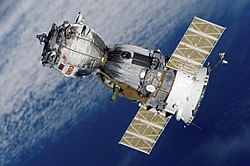 Soyuz MS-21 docked to the ISS | |
| Names | ISS 67S |
|---|---|
| Mission type | ISS crew transport |
| Operator | Roscosmos |
| COSPAR ID | 2022-028A |
| SATCAT no. | 52086 |
| Mission duration | 194 days, 19 hours, 2 minutes |
| Spacecraft properties | |
| Spacecraft | Soyuz MS-21 No. 750 Korolyov [1] |
| Spacecraft type | Soyuz MS |
| Manufacturer | Energia |
| Crew | |
| Crew size | 3 |
| Members | |
| Callsign | Don |
| Start of mission | |
| Launch date | 18 March 2022, 15:55:18 UTC [2] [3] |
| Rocket | Soyuz 2.1a |
| Launch site | Baikonur, Site 31/6 |
| Contractor | RKTs Progress |
| End of mission | |
| Landing date | 29 September 2022, 10:57:12 UTC |
| Landing site | Kazakh Steppe ( 47°23′N69°39′E / 47.383°N 69.650°E ) |
| Orbital parameters | |
| Reference system | Geocentric orbit |
| Regime | Low Earth orbit |
| Inclination | 51.64° |
| Docking with ISS | |
| Docking port | Prichal nadir |
| Docking date | 18 March 2022, 19:12:06 UTC |
| Undocking date | 29 September 2022, 07:34:20 UTC |
| Time docked | 194 days, 12 hours, 22 minutes |
 Mission insignia, inspired by the crest of the Bauman Moscow State Technical University  From left: Matveev, Artemyev and Korsakov | |
Soyuz MS-21 was a Russian Soyuz spaceflight to the International Space Station (ISS) with a crew of three launched from Baikonur on 18 March 2022. The launch was previously planned for 30 March 2022, but in the provisional flight manifest prepared by Roscosmos by the end of Summer 2020, the launch of Soyuz MS-21 was advanced to 18 March 2022. [2]
Contents
It was the first mission to the ISS with three Roscosmos cosmonauts. [4]
On 29 September 2022, after 6 months and 11 days, the mission completed successfully as planned with a landing on the Kazakh Steppe in Kazakhstan. [5]

